Terence Irving Barrett - Terry to his family, but Ted to his wide circle of friends in and out of the Regiment - was born in Chelmsford in 1950, the eldest of seven children. It was an upbringing that was to stand him in good stead throughout his life. For although his parents were strict, it was a loving family into which Ted and his siblings were born. The accent was on family values and the standards in life to which they should all aspire.
On leaving school at 15,Ted intended to join the army. His parents were initially against this and insisted that he attend college for a year. While it is often difficult to identify the catalyst for a chosen career, it is more than likely that he was influenced by a close friend of the family - Sid Day - who had served with Airborne Forces as a Glider Pilot at Arnhem. In any event, rising 17 years old,Ted set off to join The Parachute Regiment with three local friends.
His service with the Regiment spanned seventeen years, principally in 2 PARA. He was involved in operations in Northern Ireland and Belize before finding himself, as Platoon Sgt 1 Pl A Coy, warned for an impending operation in the South Atlantic in the spring of 1982.
An imposing, lithe figure (a 'racing snake' in his soldier's parlance), very fit, with a moustache of considerable character, Ted was a highly professional soldier, with a dry wit and always full of life.
A week after the landings on East Falkland, Ted found himself temporarily in command of 1 Pl, as 2 PARA were committed to recapture the Darwin and Goose Green Isthmus, thus freeing the Islanders who were held prisoner in the settlements. After a brief skirmish during the hours of darkness on 28 May, A and B Coys initially went to ground.as dawn revealed entrenched enemy positions, with no hint of cover in the barren countryside. On the left flank of the advance, with no quick solution in sight, A Coy fought a sustained, courageous and determined action to capture Darwin Hill after more than 3 hours of fighting. While platoon formations were broken up in the close confines of the gully alongside the hill, Ted Barrett's leadership was exemplary. Grouping machine-gun teams together, he harassed the enemy's furthest trenches, making a significant contribution to their eventual surrender. Unphased by the size of the challenge facing him, he encouraged his men onwards and was always in the thick of it. For his actions that day, he was awarded the Military Medal: as the words on the under side simply state -'for Bravery in the Field'.
Reverting to his role as Pl Sgt, he was again to the fore in the battle to capture Wireless Ridge which contributed to the Argentine surrender.
However, the transition from war to peace is not always an easy one. Despite receiving his first recommendation for CSgt, Ted did not settle at the Depot and left the army in 1983.
His main occupation was to be in the haulage business and it is no surprise that this was successful. Driving latterly for Riby & Son from his home in Hull - occasionally with Carol, his wife, in the passenger seat - Ted took his various cargoes across the length and breadth of Europe. Mr Riby described him as “an impeccable driver, a lovely man, for whom no job was too much to ask.” Tragically, this happy partnership was to be cut short by the onset of cancer. In his determined, irrepressible way, Ted told his boss: "Don't give my cab away, I am coming back!" He died bravely, fighting it to the end.
At a moving service on 2 January 2001, family and friends filled the Catholic Church in the centre of Hull. It was a colossal turnout, not only of his former soldiers, but of the many people whose lives had been enriched by this larger than life human being.
From the Pegasus Journal
Read More
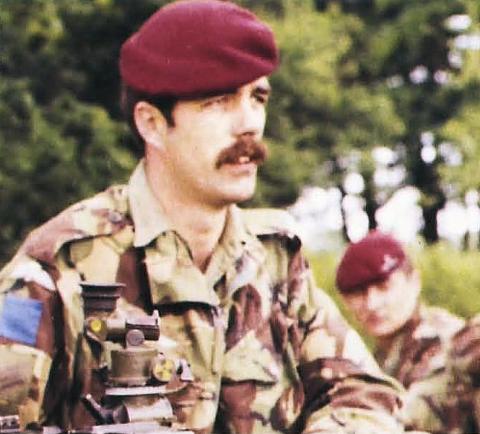

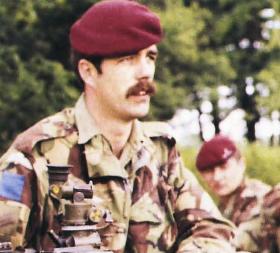

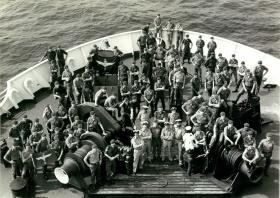
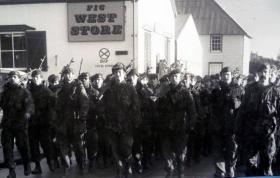
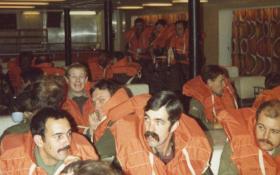
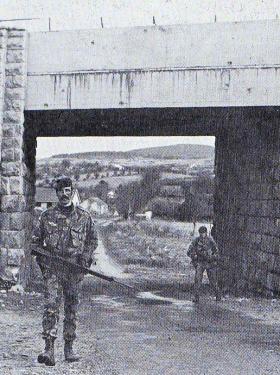
Latest Comments
There are currently no comments for this content.
Add Comment
In order to add comments you must be registered with ParaData.
If you are currently a ParaData member please login.
If you are not currently a ParaData member but wish to get involved please register.